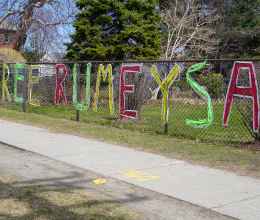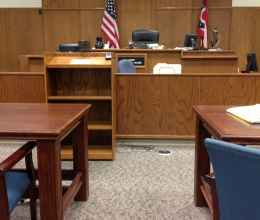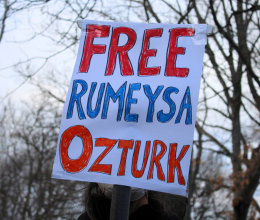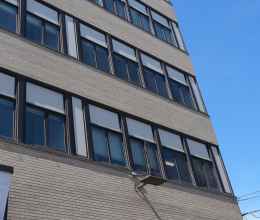
Massachusetts students have free speech rights at school, but those rights do not always protect speech that may cause substantial disruption to the learning environment.[1] In addition, Massachusetts law requires schools to restrict speech that constitutes bullying.[2]
Example 1: Jamie wears a T-shirt to school with the words “Make America Great Again.” The school’s assistant principal tells Jamie to change the shirt or to cover it because it is “too political.” Jamie believes she has a right to wear it and to express her political views. She is likely right, even if the message offends others. However, all such situations must be evaluated based on the facts and surrounding circumstances, and the courts usually give considerable deference to the school’s judgment about whether student speech creates a risk of substantial disruption.
Example 2: Thomas wears a T-shirt to school that says “White people are better” and school officials ask him to change his shirt or go home for the day. This situation requires a careful balance between rights of free expression and rights of equality and inclusion. Schools may restrict messages that (1) are demeaning on the basis of personal characteristics that are unalterable or otherwise deeply rooted such as race, sex, gender, religion, or sexual orientation and (2) are reasonably forecasted to have serious negative psychological impacts on students with the demeaned characteristic and thus cause substantial disruption in the school.[3] Schools must have a factual basis supporting their assessment that a message is demeaning and that substantial disruption has occurred or is reasonably likely to occur. [4] Schools cannot restrict speech merely because they deem it to be offensive.
Example 3: Gretchen is upset that Julia made the school soccer team and Gretchen did not. Gretchen begins texting Julia every day with messages like “everybody on the team hates you,” “you don’t deserve to be on the team,” and “hope you sprain an ankle at practice.” If these repeated messages cause Julia emotional harm or substantially disrupt her educational environment, this speech constitutes bullying as defined by Massachusetts law and may be subject to intervention by the school.
Students have a right to protest. However, they can be disciplined 1) if protests cause substantial disruption at school (see above)[5], or 2) for being absent from school or classes — although disciplinary action must not discriminate based on the students’ viewpoints and must be consistent with school policy.
Example: Miles is absent for the 11th time this year, one more than the allowed 10 unexcused absences. He was at a protest demanding the city fire his school’s principal. The school suspends him for 3 days. However, another student, Oz, who has 11 unexcused absences after taking an extended vacation with his parents, gets only one hour of detention. Miles and his parents rightfully ask the school to explain the difference in punishment; getting no satisfactory answer, they follow the school’s process for formally challenging the discipline.
In other words, there is no special right to miss school to engage in protests, rallies, or demonstrations. But schools can’t treat absences for rallies and protests more harshly than absences for other reasons, or punish you more based on the subject matter of a protest — unless the protest causes substantial disruption.
Note that schools sometimes have policies to:
- Not discipline students for being absent until the number of absences exceeds a certain number; and/or
- Allow absences for certain reasons with permission of a parent and principal.
Before you miss school for a protest, you should check your school’s policies to see if being absent might get you disciplined. Also, try to find out if there is a way to get permission so the absence won’t count. This way you’ll know in advance if you might get in trouble for missing school for the protest and can make an informed choice.
Updated September 2024
[1] Tinker v. Des Moines, 393 U.S. 503, 513 (1969) (student speech is not immunized from discipline if it “materially disrupts classwork or involves substantial disorder or invasion of the rights of others”); Massachusetts General Laws c. 71, § 82, https://malegislature.gov/Laws/GeneralLaws/PartI/TitleXII/Chapter71/Section82. Please note that while the Massachusetts Supreme Judicial Court has interpreted M.G.L. c. 71, Section 82 to authorize restrictions on student speech only under the substantial disruption prong, Pyle v. Sch. Comm. of South Hadley, 423 Mass. 283, 286-87 (1996), in L.M. v. Town of Middleborough, the U.S. Court of Appeals for the First Circuit left open whether schools may also restrict speech when it “invades the rights of others” outside of the context of behavior that rises to the level of bullying. 103 F.4th 854, 874 (1st Cir. 2024) (as of September 2024, the appellant in L.M. has indicated that he may seek review of this decision by the Supreme Court).
[2] See Massachusetts General Laws c. 71, § 37O, https://malegislature.gov/Laws/GeneralLaws/PartI/TitleXII/Chapter71/Section37O. This law defines “bullying” as “the repeated use . . . of a written, verbal or electronic expression or a physical act or gesture or any combination thereof, directed at a victim that: (i) causes physical or emotional harm to the victim or damage to the victim's property; (ii) places the victim in reasonable fear of harm to himself or of damage to his property; (iii) creates a hostile environment at school for the victim; (iv) infringes on the rights of the victim at school; or (v) materially and substantially disrupts the education process or the orderly operation of a school.”
[3] L.M., 103 F.4th at 873–74.
[4] For example, in L.M., the court deferred to the school’s assessment that a t-shirt stating “There Are Only Two Genders” was demeaning to transgender and gender non-conforming students. Id. at 881–82. The court also considered the school’s assertion that gender non-conforming students had serious struggles, including with suicidal ideation, relating to their treatment based on their gender identities and concluded that “it was reasonable for [the school] to forecast that a message displayed throughout the school day denying the existence of the gender identities of transgender and gender non-conforming students would have a serious negative impact on those students’ ability to concentrate on their classroom work.” Id. at 882.
[5] See supra n.1.



